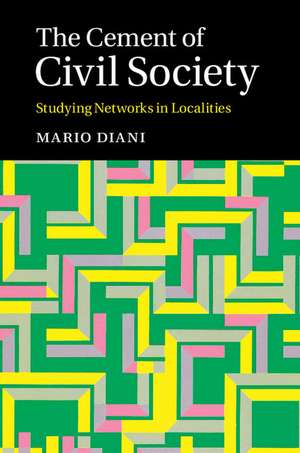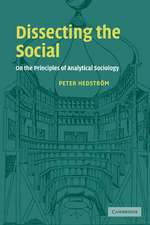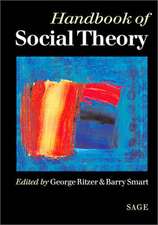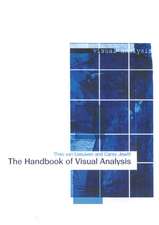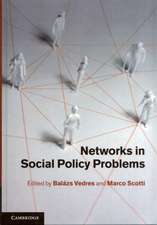The Cement of Civil Society: Studying Networks in Localities: Cambridge Studies in Contentious Politics
Autor Mario Dianien Limba Engleză Hardback – 20 mai 2015
Din seria Cambridge Studies in Contentious Politics
-
 Preț: 178.72 lei
Preț: 178.72 lei -
 Preț: 162.90 lei
Preț: 162.90 lei -
 Preț: 197.42 lei
Preț: 197.42 lei - 9%
 Preț: 626.73 lei
Preț: 626.73 lei -
 Preț: 210.35 lei
Preț: 210.35 lei -
 Preț: 220.85 lei
Preț: 220.85 lei -
 Preț: 199.89 lei
Preț: 199.89 lei - 8%
 Preț: 564.60 lei
Preț: 564.60 lei -
 Preț: 289.10 lei
Preț: 289.10 lei -
 Preț: 238.15 lei
Preț: 238.15 lei -
 Preț: 232.48 lei
Preț: 232.48 lei -
 Preț: 160.00 lei
Preț: 160.00 lei -
 Preț: 203.50 lei
Preț: 203.50 lei -
 Preț: 231.38 lei
Preț: 231.38 lei -
 Preț: 263.79 lei
Preț: 263.79 lei -
 Preț: 274.27 lei
Preț: 274.27 lei -
 Preț: 227.61 lei
Preț: 227.61 lei - 11%
 Preț: 637.54 lei
Preț: 637.54 lei -
 Preț: 474.87 lei
Preț: 474.87 lei -
 Preț: 225.50 lei
Preț: 225.50 lei -
 Preț: 269.58 lei
Preț: 269.58 lei -
 Preț: 201.59 lei
Preț: 201.59 lei -
 Preț: 229.56 lei
Preț: 229.56 lei -
 Preț: 238.13 lei
Preț: 238.13 lei -
 Preț: 306.73 lei
Preț: 306.73 lei - 11%
 Preț: 553.62 lei
Preț: 553.62 lei - 11%
 Preț: 694.04 lei
Preț: 694.04 lei -
 Preț: 231.05 lei
Preț: 231.05 lei -
 Preț: 305.33 lei
Preț: 305.33 lei -
 Preț: 201.59 lei
Preț: 201.59 lei -
 Preț: 230.51 lei
Preț: 230.51 lei - 14%
 Preț: 791.97 lei
Preț: 791.97 lei - 11%
 Preț: 555.03 lei
Preț: 555.03 lei -
 Preț: 251.27 lei
Preț: 251.27 lei - 11%
 Preț: 554.68 lei
Preț: 554.68 lei - 11%
 Preț: 459.73 lei
Preț: 459.73 lei
Preț: 695.74 lei
Preț vechi: 781.73 lei
-11% Nou
Puncte Express: 1044
Preț estimativ în valută:
133.13€ • 139.28$ • 110.59£
133.13€ • 139.28$ • 110.59£
Carte tipărită la comandă
Livrare economică 02-16 aprilie
Preluare comenzi: 021 569.72.76
Specificații
ISBN-13: 9781107100008
ISBN-10: 1107100003
Pagini: 268
Ilustrații: 24 b/w illus. 54 tables
Dimensiuni: 158 x 237 x 25 mm
Greutate: 0.56 kg
Editura: Cambridge University Press
Colecția Cambridge University Press
Seria Cambridge Studies in Contentious Politics
Locul publicării:New York, United States
ISBN-10: 1107100003
Pagini: 268
Ilustrații: 24 b/w illus. 54 tables
Dimensiuni: 158 x 237 x 25 mm
Greutate: 0.56 kg
Editura: Cambridge University Press
Colecția Cambridge University Press
Seria Cambridge Studies in Contentious Politics
Locul publicării:New York, United States
Cuprins
Introduction: of King Solomon, Goethe, and civic networks; 1. Modes of coordination of collective action; 2. The importance of local comparisons: civic organizations in British cities; 3. Building civic networks: strategies of tie formation; 4. The structural bases of civil society; 5. Network positions and their incumbents; 6. The duality of organizations and events; 7. Network centrality and leadership; 8. Civic networks and urban governance; 9. 'Networking' contentious politics; Postfaction: bringing time and space(s) into the picture.
Recenzii
'Social movements are just one among several important and interrelated modes of coordinating collective action. Networks are outcomes of, rather than preconditions for, sustained interactions among groups and organizations. Elaborating this vision, Mario Diani puts social movements in their place and turns networks on their head while cementing the foundation of a truly innovative framework for rigorous analysis of civil society as a distinct field. Read this book as a blueprint for the future of research on collective action in civil society.' Ronald Breiger, University of Arizona
'By moving beyond aggregative, trait-based views of social and political structure to relational conceptions, Diani deftly turns the kaleidoscope to reveal heretofore unseen patterns in civil society. His fascinating findings supplement some existing literature while turning some traditional conclusions on their heads. This work creates a new, compelling imperative for incorporating complex network dynamics into research on civil society organizing.' Janet L. Fulk, University of Southern California
'… a major contribution to relational sociology, the study of civil society and social movement studies. Diani's book is a huge step in the right direction, not only for political sociology and social movement studies, but for sociology more generally. Let us hope that it taps into the current relational momentum in sociology, infusing it with the methodological and empirical dimension which, sadly, it often lacks, and thus perhaps helping to make a genuine difference to the discipline.' Nick Crossley, PArtecipazione e COnflitto
'The Cement of Civil Society advances such a rich and insightful research agenda … [It] provides an impressive theoretical contribution to the literature on civic networks and social movements. Finally, the epistemological and methodological reorientation Diani proposes throughout this book will certainly embody a long-lasting contribution to the way we think and study the structure of local civil societies.' Gianluca De Fazio, PArtecipazione e COnflitto
'Mario Diani's masterful new book … convincingly argues that relations are central to understanding contentious politics … this is an important book that will serve as a primary reference on social movement networks. I was not only thoroughly impressed by its theoretical and methodological sophistication, but also by its careful and logical structure. Diani patiently guides the reader through an extremely complex process that reveals how relations are constructed and structured, and how they affect practices and influence in two different cities. The book is a must read for any scholar and student interested in social movements and contentious politics.' Walter J. Nicholls, PArtecipazione e COnflitto
'The Cement of Civil Society … brings valuable insights for the study of nonprofit organizations, mainly by showing how the distinction between formal organizations and informal groups may hide practices and relationships that are relevant for understanding the role and possibilities of civil society … it is a valuable contribution to the discussion of the relationship between nonprofits, social movements, and other civil society groups.' Marcelo Marchesini, Nonprofit and Voluntary Sector Quarterly
'By moving beyond aggregative, trait-based views of social and political structure to relational conceptions, Diani deftly turns the kaleidoscope to reveal heretofore unseen patterns in civil society. His fascinating findings supplement some existing literature while turning some traditional conclusions on their heads. This work creates a new, compelling imperative for incorporating complex network dynamics into research on civil society organizing.' Janet L. Fulk, University of Southern California
'… a major contribution to relational sociology, the study of civil society and social movement studies. Diani's book is a huge step in the right direction, not only for political sociology and social movement studies, but for sociology more generally. Let us hope that it taps into the current relational momentum in sociology, infusing it with the methodological and empirical dimension which, sadly, it often lacks, and thus perhaps helping to make a genuine difference to the discipline.' Nick Crossley, PArtecipazione e COnflitto
'The Cement of Civil Society advances such a rich and insightful research agenda … [It] provides an impressive theoretical contribution to the literature on civic networks and social movements. Finally, the epistemological and methodological reorientation Diani proposes throughout this book will certainly embody a long-lasting contribution to the way we think and study the structure of local civil societies.' Gianluca De Fazio, PArtecipazione e COnflitto
'Mario Diani's masterful new book … convincingly argues that relations are central to understanding contentious politics … this is an important book that will serve as a primary reference on social movement networks. I was not only thoroughly impressed by its theoretical and methodological sophistication, but also by its careful and logical structure. Diani patiently guides the reader through an extremely complex process that reveals how relations are constructed and structured, and how they affect practices and influence in two different cities. The book is a must read for any scholar and student interested in social movements and contentious politics.' Walter J. Nicholls, PArtecipazione e COnflitto
'The Cement of Civil Society … brings valuable insights for the study of nonprofit organizations, mainly by showing how the distinction between formal organizations and informal groups may hide practices and relationships that are relevant for understanding the role and possibilities of civil society … it is a valuable contribution to the discussion of the relationship between nonprofits, social movements, and other civil society groups.' Marcelo Marchesini, Nonprofit and Voluntary Sector Quarterly
Notă biografică
Descriere
This book analyzes civil society as a field of organizations mobilizing on collective goals.
